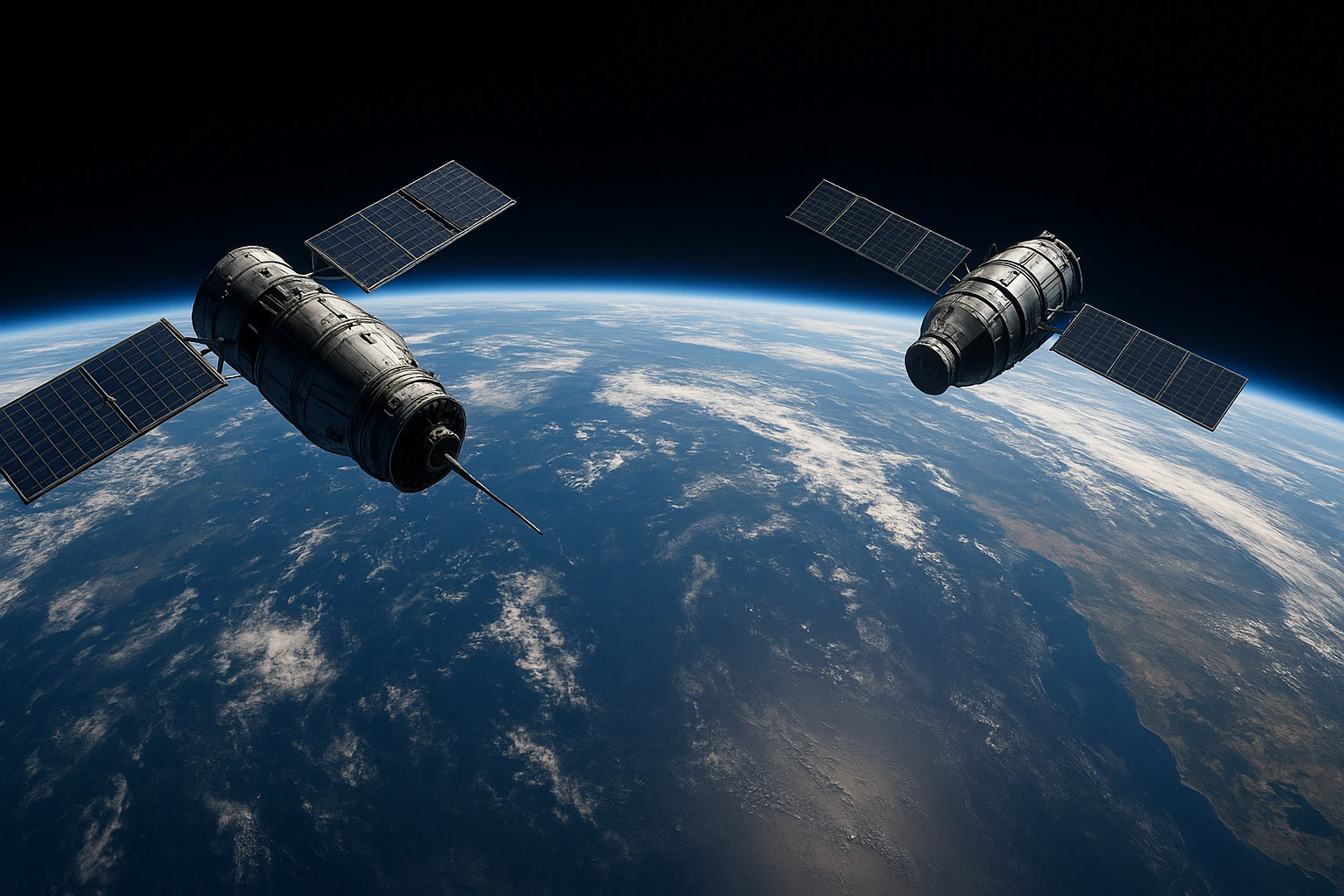In recent years, outer space has shifted from being a silent frontier of exploration to a contested arena of strategy, power, and influence.
The latest warning from Germany’s Defence Minister, Boris Pistorius, about Russian satellites shadowing Western satellites has once again highlighted the urgency of addressing space security.
This is not just a distant geopolitical chess game it’s a direct threat to military communications, global internet, and even everyday civilian life that depends on satellites for navigation, banking, and secure data transmission.
In This Article
- Why Russian satellites shadowing others pose a serious risk to global security.
- Actionable steps and strategies nations can adopt to protect their space assets.
- The future impact of satellite warfare on technology, defense, and global stability.
Russia’s Shadow Satellites: The Silent Stalkers in Orbit
German officials recently raised concerns over two Russian Luch/Olymp satellites that have been seen maneuvering unusually close to commercial and military satellites operated by Intelsat, a company running over 50 geostationary satellites.
Unlike traditional satellites that remain in fixed orbits, these Russian satellites have developed a reputation for loitering moving suspiciously close to other satellites and sometimes staying nearby for prolonged periods.
This behavior has raised alarms among Western defense agencies. A French start up, Aldoria, observed a Russian satellite making a sudden close approach to another geostationary satellite in May 2024.
A US based firm reported unfriendly behavior when the same satellite repeatedly stopped near non Russian satellites, raising concerns of eavesdropping.
At distances as close as 10 kilometers considered extremely close in orbital terms these maneuvers suggest the intent may not be innocent scientific curiosity but rather strategic surveillance or disruption.
Why Shadowing Satellites Is Dangerous
By parking close to another satellite, hostile nations can potentially intercept secure transmissions, from military communications to corporate data.
Analysts warn that shadow satellites can jam signals, interfering with navigation systems, GPS, or encrypted defense communications.
While not yet confirmed, experts suggest satellites could one day be used to kinetically damage or disable another satellite similar to a space collision weapon.
Military analyst Sean Bell described the behavior as a bit like Moonraker a deliberate test to see how close Russia can get without triggering a response.
Germany is not standing still. At a Berlin space conference, Defence Minister Pistorius announced a €35 billion investment over the next five years into national and European space security programs.
Strengthening satellite resilience against cyberattacks. Developing early warning systems to track hostile satellites. Exploring offensive deterrence capabilities to discourage Russia or China from taking aggressive actions in orbit.
This reflects a broader NATO trend, where space has been recognized as a fifth domain of warfare alongside land, sea, air, and cyberspace.
China’s 2007 Anti Satellite Test, China shocked the world by destroying one of its own satellites with a missile, proving satellites are vulnerable to direct attack.
US Space Force Formation 2019, The US formally established the Space Force to address growing threats from Russian satellites and Chinese space assets.
Russia’s 2021 ASAT Test, Russia destroyed a satellite, creating thousands of pieces of debris, which endangered the International Space Station ISS.
Each of these events reinforces that the shadowing strategy is not accidental it’s part of a broader competition for space dominance.
Actionable Strategies to Protect Satellites
Space Traffic Monitoring, Nations need advanced surveillance systems to track satellite maneuvers in real time, much like air traffic control for aircraft.
Encryption and Hardening, Military and commercial operators must upgrade their satellites with stronger encryption and anti-jamming technologies.
Allied Coordination, NATO, the EU, and the US should share satellite data and develop joint defense responses to space threats.
Private Sector Collaboration, Companies like Intelsat, SpaceX, and OneWeb must coordinate with governments to secure commercial satellites, as they are often dual use assets.
International Treaties, Just as nuclear weapons treaties set boundaries, a global framework for satellite conduct is urgently needed.
The presence of Russian satellites shadowing Western satellites is more than just a technical concern. It reflects a shift in global power dynamics.
Space has become the ultimate high ground, and whoever controls it can dominate communications, surveillance, and even missile defense systems.
For civilians, the impact is equally serious. Imagine a future where banking transactions, GPS navigation, or even internet services are suddenly disrupted not by a hacker on Earth, but by a satellite 36,000 kilometers above us.
Sean Bell, Military Analyst, It’s definitely a threat to our military comms, and potentially space based capabilities.
European Space Agency ESA, Warns that hostile maneuvers can destabilize orbital safety and create long lasting risks from debris.
US Defense Officials, Have long suspected Russia’s inspector satellites are designed for intelligence gathering and possible offensive roles.
Over the next decade, we can expect, More nations investing in defensive and offensive space capabilities. A surge in AI driven satellite monitoring systems.
Growing pressure for international space treaties regulating close proximity operations. Space is no longer a neutral frontier it is a contested and militarized domain.
Nations that fail to invest in protecting their satellites risk losing not just communications but also national security. The warning from Germany’s Defence Minister is a wake up call the silent maneuvers of Russian satellites in orbit are not just symbolicBthey are a strategic threat.
The world is entering an era where satellites, once tools of science and communication, are also weapons and targets.
If Europe, NATO, and global partners want to secure the future of space, the response must be swift, coordinated, and backed by robust investments.
What do you think? Should space be treated as a military battlefield or preserved as a peaceful domain? Share your thoughts in the comments below and don’t forget to subscribe for more deep dives into space, defense, and global security trends.
